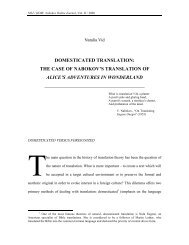Nabokov's Invitation to Plato's Beheading
Nabokov's Invitation to Plato's Beheading
Nabokov's Invitation to Plato's Beheading
- TAGS
- beheading
- etc.dal.ca
You also want an ePaper? Increase the reach of your titles
YUMPU automatically turns print PDFs into web optimized ePapers that Google loves.
NOJ / НОЖ: Nabokov Online Journal, Vol. I / 2007<br />
distinction between two different characteristics of the same person also evokes Pla<strong>to</strong>’s<br />
portrayal of Socrates who sometimes appears confident in his reasoning about<br />
immortality while at other times is notably ridden by doubts. 7<br />
What <strong>to</strong>rments Cincinnatus and Socrates, who found themselves in the same<br />
situation, is the question of how real that place where their reasoning and imagination<br />
often take them is. Strangely, most commenta<strong>to</strong>rs do not share their doubts, discussing<br />
Cincinnatus’ immortality as something certain. Brian Boyd, in his reading of the novel,<br />
commented on Cincinnatus’ situation: “Only beyond death can a mind so alive find its<br />
true scope” (413), which can remind us of equally optimistic readings of Socrates’ death.<br />
At the execution Cincinnatus does not die, Boyd wrote, but “tears a hole in his world <strong>to</strong><br />
reach his likes beyond” (415). 8 Cincinnatus’ fate, however, is more uncertain than this.<br />
Nabokov, perhaps unintentionally echoing Pla<strong>to</strong>’s way of writing about Socrates’<br />
wavering hopes for immortality, gave us many reasons <strong>to</strong> believe that Cincinnatus<br />
survived his execution, while at the same time hinting that he did not.<br />
7 We can also distinguish two distinct images of Socrates in the context of Socratic literature in<br />
general. Xenophon portrays Socrates as a philosopher who is completely assured of his immortality and<br />
intentionally defies the jury during his trial in anticipation of his death (or afterlife). Pla<strong>to</strong>, in contrast,<br />
creates image of Socrates as a less confident man.<br />
8 Likewise, Socrates suggests at one point that death is the final step <strong>to</strong>ward satisfying a philosopher’s<br />
desire for wisdom, arguing that “when we are dead, [we] attain that which we desire and of which we claim<br />
<strong>to</strong> be lovers, namely, wisdom” (Phaedo 66e). Many critical responses <strong>to</strong> the novel are equally optimistic<br />
about Cincinnatus’ survival. Gavriel Shapiro, by comparing Cincinnatus <strong>to</strong> Christ, argued that Christian<br />
allusions “enable <strong>to</strong> interpret the novel’s close as the resurrection of its hero” (124). Vladimir Alexandrov,<br />
in his examination of the novel’s Gnostic motives, was equally optimistic when he concluded that<br />
Cincinnatus “appears <strong>to</strong> transcend his mortal being following his decapitation” (86) so that his soul is<br />
allowed <strong>to</strong> escape the confines of his body and “return <strong>to</strong> the spiritual homeland <strong>to</strong> which he had been<br />
attached throughout his life” (87). Julian W. Connolly, for his part, wrote that the “end of the novel depicts<br />
Cincinnatus picking himself up from the ruble of the world disintegrating around him and heading off<br />
<strong>to</strong>ward a new realm of kindred spirits” (183). Countering such an incorrigible tradition of interpretive<br />
optimism, Dale Peterson wrote in his admirably elaborate “Literature as Execution” that although “critics<br />
[often] assumed that Nabokov invites his readers <strong>to</strong> believe that imagination can rise above everything and<br />
anything, redeeming mundane hurts and losses,” it is doubtful that Nabokov “can actually be irresponsible<br />
enough <strong>to</strong> advocate imaginative escapism as an adequate response <strong>to</strong> police states” (70).
















